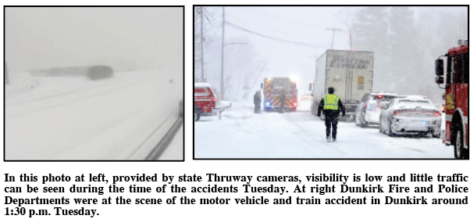Ready To Reopen
Area Businesses Preparing For Phase Two Green Light
- Though they have been unable to work from their main office, real estate agents have been active remotely throughout New York State on PAUSE. P-J Photos by Cameron Hurst
- Nick Amatuzzo, co-owner of Salon 1, takes calls for appointments should they be able to resume operation on Tuesday. P-J Photo by Cameron Hurst

Though they have been unable to work from their main office, real estate agents have been active remotely throughout New York State on PAUSE. P-J Photos by Cameron Hurst
With Lt. Gov. Kathy Hochul’s indication this week that Western New York could enter Phase Two of the state’s reopening plan on Tuesday, locally several eligible businesses have started preparing to reopen their doors for the first time since March.
Upon reopening their phone lines this week, Salon 1 in Jamestown has been “flooded with appointments,” according to co-owner Kelly Amatuzzo.
“We’ve really missed our clients,” she said of the overwhelming response. “We know by the massive outpouring of support and love we had during this closure that they are also ready to see us and they have been nothing short of amazing and understanding regarding the limited appointments due to restrictions.”
However, while Amatuzzo had organized a reopening plan, when reached Thursday, guidelines from the state had not been immediately made clear until Friday when they were released. Guidelines include limiting the workforce and customer presence to no more than 50% maximum occupancy, maintaining social distancing among stylists and requiring customers and employees to wear a mask, among others, something that Amatuzzo had already accounted for in a copy of her plan provided to The Post-Journal.
“What I do know is that when the guidelines do come out, we will 100% compliant with them,” she said on Thursday, noting that her plan has allowed for some flexibility. “It may be a last-minute, working-all-night effort to get Salon 1 COVID-compliant for opening day, but, we will do it.”

Nick Amatuzzo, co-owner of Salon 1, takes calls for appointments should they be able to resume operation on Tuesday. P-J Photo by Cameron Hurst
Above all else, Amatuzzo, who, with her husband Nick, purchased the salon in November from longtime owner Mike Giunta, is relieved to welcome back her employees.
“My main concern when we first learned we had to shut down was my employees,” she said. “They rely on this income and I was so worried about them because we really are like a big family at the Salon.”
Phase Two will also allow an expansion of real estate activities — something Bill Soffel, President and CEO of ERA Team VP Real Estate — said his team has been preparing for, continuing to work remotely in the weeks since closing their physical office.
According to the state’s guidelines, real estate agents will only be allowed to conduct showings in unoccupied and or vacant properties, among other regulations, something Soffel said his team is prepared to do, having previously taken cues from the New York State Association of Realtors in order to find remote ways to continue operating.
“If a homeowner wants to sell their home, we can go over and tour the property as long as the sellers leave the house,” Soffel said. “We can go through, evaluate the property and take pictures and then head back to our home office and call the owner on the phone and discuss. We can also go in and do a virtual showing once a property is listed, call our customer on the phone and use Zoom or FaceTime or some comparable technology and do a live walking tour through the home.”
The result, Soffel explained, has been encouraging.
“We’ve actually sold quite a large number of properties with that procedure well in excess of what our expectations were,” he said. “In the last few weeks, most of the brokers have started to slowly allow showings. The guidelines aren’t particularly clear on what we can and cannot do, so we’ve been taking a conservative approach. I know that things are starting to loosen up. The interpretation has started to loosen up a little bit.”
Soffel’s business also operates in Pennsylvania, with offices in Warren and Bradford, whose counties, Warren and McKean, respectively moved into the Green Phase of Governor Tom Wolf’s reopening plan, creating an “added challenge.”
“New York and Pennsylvania are operating under different regulations so we’ve had to assist our agents in each state a little differently,” he said, noting that the latter originally prohibited agents and buyers from doing any real estate activity that could not be conducted from their homes.
“In one case we had a seller who did a FaceTime call video of their home with our agent and the buyer, on separate phones, did a remote showing and ended up selling the property on that basis,” he said.
And while residential sales have made Soffel optimistic, the pandemic has also fostered a challenge for vacation property sales and rentals — something of which his business handles a significant volume during the summer months.
“We are estimating that the final booking numbers will probably be, worst case, 25% of what they would have been and best case, 50%,” Soffel said, noting that ERA Team VP manages approximately 100 properties in Chautauqua Institution. “Most of our owners are offering significant discounts upward of 50% on the rental rate to encourage patrons to keep their reservations. Some are taking advantage of that, but the majority are canceling.”
“On an encouraging note, we are getting inquiries every day from folks who perhaps see this as an opportunity to see Chautauqua or try out the lake at a reduced rate,” he added. “We may introduce some families who will be experiencing Chautauqua Institution and Chautauqua Lake perhaps for the first time which in the long run, I think, will be positive.”
And while the real estate market, as a whole, has been set back by the outbreak of COVID-19, Soffel does have faith it will rebound.
“The real estate market was in a very strong position leading into this crisis and while there’s no question the pandemic has had a negative impact on it, it’s much more likely to return to a positive market quickly as opposed to the financial crisis in 2008,” he said. “I think the demand still seems to be there and I would expect that once we get into Phase Two and beyond, we’ll start seeing a pretty significant pickup in activity.”







